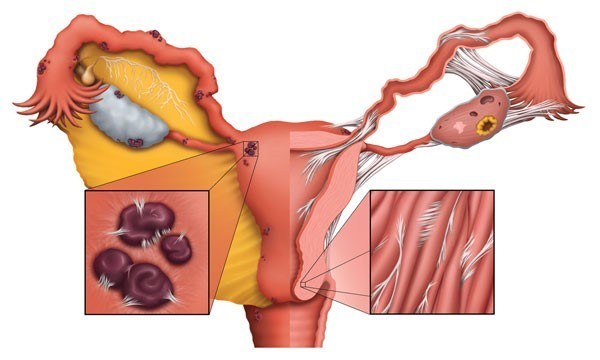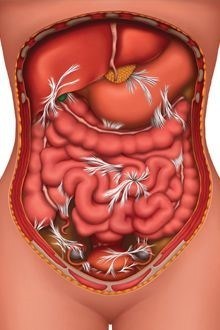ENDOMETRIOSIS TREATMENT & CARE AT JFC
A common female reproductive system issue that is said to affect around 25 to 50% of women who experience infertility, Endometriosis is hailed as a common Gynaecological condition wherein the women develop tissues outside their uterus on other reproductive organs in the abdominal cavity that looks and acts like Endometrial tissue.
The misplaced endometrial tissue grows and sheds later in response to the hormonal changes of the woman’s menstrual cycle. This result in internal bleeding and the tissue attached to other organs that share the abdominal cavity with the woman’s uterus.

ENDOMETRIOSIS – STAGES, CAUSES AND ALL THAT
STAGES
- STAGE I or MINIMAL: Its characterised by a few isolated endometrial implants outside the woman’s uterus and a minimal number of mild adhesives, if any.
- STAGE II or MILD: Its characterised by more and slightly deeper implants less than 5 cm in total and a minimal number of mild adhesions.
- STAGE III or MODERATE: Its characterised by many deep implants, small endometriomas of cysts on one or both ovaries and some filmy adhesions or scars.
- STAGE IV or SEVERE: Its characterised by multiple deep implants, large endometriomas or cysts on either or both ovaries as well as multiple dense (thick) adhesions, often involving other organs.
CAUSES
Till date, the causes of Endometriosis are still unknown. However some factors can be attributed as causes like:
- During menstruation, some of the tissue backs up through the Fallopian tubes into the woman’s abdomen. Its termed as a sort of reverse menstruation where it attaches and grows.
- Endometrial tissue that travels and implants via blood or lymphatic channels, similar to the way cancer cells move and spread.
- Cells in any location may transform into endometrial cells.
- Result of direct transplantation – in the abdominal wall after a Cesarean section.

WHERE THEY CAN OCCUR?
They can occur in the Ovaries, Fallopian Tubes, Ligaments that support the uterus, Posterior cul-de-sac (space between the uterus and rectum), outer surface of the uterus, and the lining of the pelvic cavity.
SURGICAL MANAGEMENT OF ENDOMETRIOSIS AT JUHI FERTILITY
- LAPAROSCOPIC SURGICAL TREATMENT: Regarded as the primary treatment for Endometriosis, it involves the insertion of a lighted viewing instrument called a Laparoscope through a small incision. For better access, two more small incisions can be made for inserting other surgical instruments.
- LAPAROTOMY: A traditional abdominal surgery which requires a larger incision to facilitate the management of advanced Endometriosis within the pelvic cavity and the rectum / vagina.
- HYSTERECTOMY: It should be resorted to only in the most severe cases of Endometriosis when the disease does not respond to other measures. It could also be considered wherein
- Both the patient and the Gynecologist after the couple’s child-bearing is complete and the woman has had repeated conservative surgeries.
- Severe recto-vaginal disease exists together with severe Endometriosis of the cervix and rectal disease is present.
When compared to other procedures, IVF treatment continues to become more popular and commonplace, which means that the technology and success rates continue to improve as well.
As per medical experts, the best chance of cure for Endometriosis (severe case) lies with the removal of the woman’s uterus and ovaries along with the Endometriotic disease.
ENDOMETRIOSIS PROCESS / CARE AT JUHI FERTILITY
Juhi Fertility Centre (JFC) offers an inter-disciplinary approach to chronic cases of Endometriosis which includes a combination of pain education sessions, pelvic floor physiotherapy, clinical counselling, medical management and surgery.
COUNSELLING
- Mind techniques to help reduce stress and chronic pain.
- Guidance and advice on management of intense emotions and negative thoughts.
- Practise of ways to effect lasting lifestyle changes including diet and physical activity.
- Ways to induce increased communication and support in relationships.
- Advice on how to address symptoms of anxiety, depression or trauma that can cause chronic pelvic pain.
- Advice on taking appropriate decisions regarding fertility and surgery options.
The counselor at JFC also provides useful tips on how and where to access online resources for choric pain, mental health and wellness.

